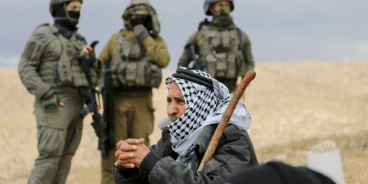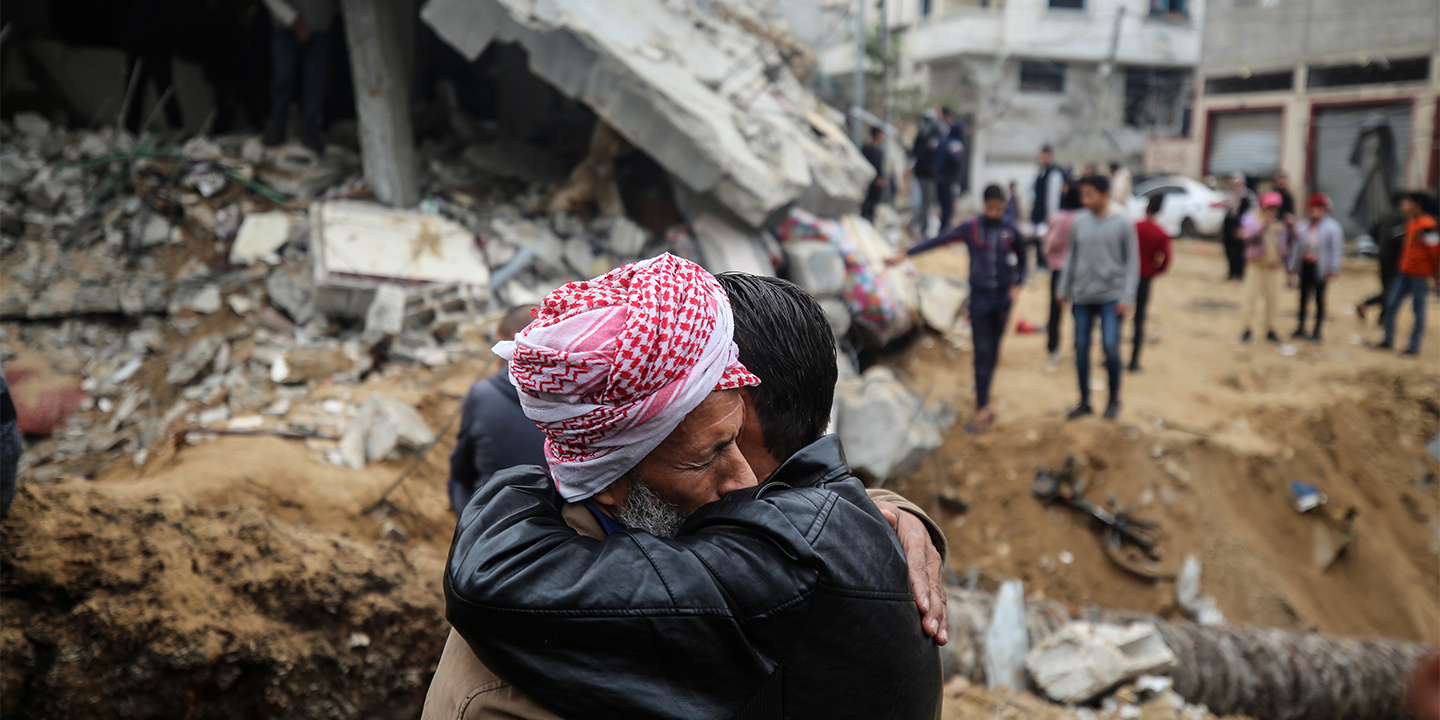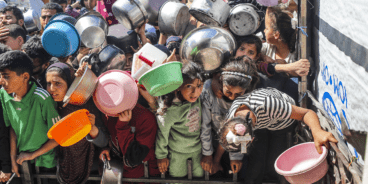

Atrocity Alert No. 382: Israel and the Occupied Palestinian Territory, DR Congo and Venezuela
Atrocity Alert is a weekly publication by the Global Centre for the Responsibility to Protect highlighting situations where populations are at risk of, or are enduring, mass atrocity crimes.
ISRAEL’S MOUNTING ASSAULT ON RAFAH WILL LEAD TO FURTHER ATROCITY CRIMES
On 9 February Israeli Prime Minister Benjamin Netanyahu announced that military operations in Gaza will expand into Rafah governorate. Since then, Israel has ramped up bombardments on Rafah, striking countless residential buildings and killing hundreds of Palestinians as military ground operations are impending. UN High Commissioner for Human Rights Volker Türk called the prospect of a full Israeli military incursion into Rafah “terrifying” and warned that “The prospect of such an operation into Rafah, as circumstances stand, risks further atrocity crimes.”
Rafah governorate currently hosts nearly 1.5 million internally displaced Palestinians after successive evacuation orders by the Israeli military instructed Palestinians in Gaza to move there for safety and shelter. These internally displaced persons (IDPs) are living in makeshift structures, tents or out in the open without basic necessities to survive while the risk of famine and communicable disease outbreaks loom. Indiscriminate bombardments of densely populated areas in Rafah risks countless more civilian deaths and will inflict insurmountable challenges on already-constricted humanitarian aid operations.
Risks of forced displacement or forcible transfer of the Palestinian population are also mounting. There is nowhere left for IDPs to flee in Gaza as Israeli military operations have caused widespread destruction, particularly in northern Gaza, where hundreds of thousands of Palestinians do not have homes to return to. Ongoing evacuation orders by the Israeli military have not included any guarantees of safety, accommodation and return for IDPs.
On 12 February South Africa made an urgent request to the International Court of Justice (ICJ) to consider whether Israel’s extension of military operations in Rafah would require the ICJ to use its power “to prevent further imminent breach of the rights of Palestinians in Gaza.” In its request, South Africa expressed grave concern that Israel’s military offensive in Rafah would be in serious and irreparable breach of the Genocide Convention and the ICJ’s provisional measures order on 26 January.
Savita Pawnday, Executive Director of the Global Centre for the Responsibility to Protect, said, “Israel has brazenly perpetrated a consistent, well-documented pattern of grave international law violations, including likely atrocity crimes across the Gaza Strip since 7 October, despite countless warnings of the need to prevent unnecessary civilian suffering. It is long past time for the government of Israel to heed the many high-level warnings regarding atrocities perpetrated during its operations, comply with all its obligations under international law and abide by the ICJ’s provisional measures order.”
All states parties to the Genocide Convention should uphold their obligations and ensure Israel’s compliance. All member states must urgently uphold their responsibility to protect and prevent likely crimes from occurring, as well as refrain from aiding and abetting the commission of atrocity crimes, including by suspending the provision of any arms to Israel. A ceasefire must be immediately implemented in Gaza and full, unimpeded humanitarian access granted.
SURGE IN MASS DISPLACEMENT AS CONFLICT INTENSIFIES IN MASISI TERRITORY, EASTERN DRC
Since 2 February over 130,000 people have been forced to flee in Masisi territory, Democratic Republic of the Congo, following the latest escalation in the conflict between the March 23 Movement (M23) armed group and government armed forces (FARDC) supported by pro-government militias. In recent weeks, scores of civilians in the towns of Sake and Mweso have been killed and injured by the use of heavy weapons in populated areas by parties to the conflict, including in camps for displaced people. On 25 January mortar bomb attacks in Mweso killed 19 people and injured at least 20, while heavy clashes in Sake killed at least seven people and injured 31 others on 7 February. One resident of Sake said, “Bombs are being dropped in the city… We are fleeing but we don’t know where we are going to live.” On 12 February at least three civilians were killed and 8 injured by a bomb explosion in a displacement camp on the outskirts of Sake.
Artillery, drones and explosives have also damaged and destroyed civilian infrastructure. According to humanitarian sources, munitions have landed inside a school courtyard and close to a hospital. In the last week of January, bullets hit the Medecins Sans Frontieres base and Mweso hospital, where thousands of residents had been taking shelter. The fighting has made the delivery of aid, including medical supplies, to isolated areas in Rutshuru and Masisi increasingly difficult or near impossible, while the approximately 630,000 people who were previously displaced in the region have limited access to life-saving medical care.
The UN Office for the Coordination of Humanitarian Affairs warned that fighting “could compromise food security and economic activities in Goma and the region. The risk of Goma being isolated is high.” M23 fighters have already blocked the two main roads into the city from the north and west, preventing the flow of goods and humanitarian aid.
The ongoing wave of violence follows outbreaks of conflict in North Kivu throughout 2023, with multiple ceasefire attempts breaking down and M23 recapturing large swathes of territory. Since November the UN peacekeeping mission (MONUSCO) has engaged in joint operations with the FARDC to protect populations and safeguard Sake and Goma from M23’s advance. However, security challenges have arisen, and the recent violence has reignited anti-MONUSCO sentiments. On 2 February a MONUSCO helicopter carrying out a medical evacuation came under fire from suspected M23 fighters, injuring two peacekeepers. From 10-11 February violent protests in Kinshasa resulted in several Mission vehicles being set ablaze. The deteriorating situation prompted the UN Security Council to hold an emergency meeting on 12 February.
All armed actors must abide by International Humanitarian Law, including by taking precaution to spare civilians and civilian objects and restricting the use of explosive weapons with wide area effects in populated areas. Congolese authorities and M23 should take steps toward de-escalation, including agreeing on a lasting ceasefire.
VENEZUELAN GOVERNMENT INTENSIFIES REPRESSION AS COUNTRY ENTERS ELECTORAL PERIOD
In recent weeks government repression has significantly intensified in Venezuela ahead of scheduled presidential elections. In mid-January the government declared the activation of the civil-military police plan “Furia Bolivariana” to allegedly confront coup or terrorist attacks/conspiracies, which the civil society organization Centro de Justicia y Paz defines as “a mechanism of repression, control and persecution.” As part of this plan, on 22 January Attorney General Tarek William Saab, an ally of President Nicolás Maduro, announced the arrest of more than 30 people for allegedly planning violent acts, including an assassination attempt against the President.
On 9 February Rocío San Miguel, founder of the nongovernmental organization Control Ciudadano and a highly respected human rights defender, was arbitrarily detained at Venezuela’s Simón Bolívar International Airport for alleged involvement in the plot. While it has recently been confirmed that San Miguel has been transferred to the civilian intelligence services’ detention center, El Helicoide, her whereabouts and conditions – as well as that of the family members who were also detained by state agents – were unknown until 13 February, amounting to enforced disappearance.
These latest measures have taken place amid a systematic crackdown on political opponents and wider civic space. On 26 January the Supreme Court upheld a ban on the leading opposition candidate, María Corina Machado, while several regional leaders from her party were arbitrarily detained and remain missing. On 9 January Venezuela’s National Assembly announced renewed efforts to expedite the adoption of an undisclosed bill which would effectively hinder the free functioning of civil society organizations and impact millions of Venezuelans in need of assistance.
Nongovernmental organizations have cautioned for over two years that repression will intensify ahead of the 2024 and 2025 elections, following similar patterns during previous voting cycles. On 13 February the UN Human Rights Council-mandated Fact-Finding Mission (FFM) on Venezuela warned that the latest measures are not “isolated incidents, but rather a series of events that appear to be part of a coordinated plan to silence critics and perceived opponents.” In September the FFM warned that the government had intensified policies of crushing dissent, including through increased targeted attacks on democratic space and civil society such as unionists, independent media, political opposition and human rights defenders. Previous investigations by the FFM determined that these may amount to crimes against humanity.
February marks a decade since the start of the government’s brutal crackdown on street protests, accompanied by systematic policies to repress dissent through arbitrary detentions, torture, sexual violence and enforced disappearances. Since 2014 state agents have also committed tens of thousands of extrajudicial executions to allegedly combat crime.
At this critical moment, with clear warning signs of renewed atrocity crimes and intensifying targeted persecution, the international community has a small but important window of opportunity to prevent further deterioration. As a first step, regional governments, including key actors such as Brazil, Colombia and Mexico, the United States, Canada and the European Union, among others, should exert coordinated political and diplomatic pressure on the government to halt intensifying repression and call for the immediate release of San Miguel, as well as all other individuals forcibly disappeared or arbitrarily detained.
Related Content


Gaza: Starvation or Gunfire - This is Not a Humanitarian Response
